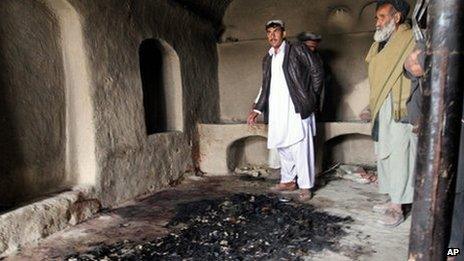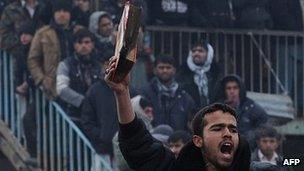How Afghans will view Kandahar killing spree
- Published
- comments

The charge that an American soldier murdered 16 civilians near Kandahar, most of them children, is one of those moments where the Western view of events in that country tends to differ vitally from that of Afghans.
Having visited Afghanistan many times over the space of 25 years, I would wager that the average person there is more angry about the Americans burning Korans at Bagram airbase.
It is not that the killing near Kandahar is not an awful tragedy for the families concerned, nor that people locally will be indifferent to their loss. Rather the Afghan attitude to suffering in war is born of decades of struggle, often merciless, and that people there will not tolerate insults to their religion.
Anti-US stronghold
Panjwai, the district where the US sergeant is accused of running amok, was deeply prejudiced against foreign forces well before this happened.

The burning of Korans at Bagram sparked a wave of violent protest
It is one of the places where Taliban leader Mullah Omar used to preach regularly, and has been the focus of several major Nato/Afghan operations.
Prior to Sunday's killing spree, you would have found much hatred of the Americans in Panjwai, where Western forces have come under attack countless times.
You would also have found a great many men who were willing to plant bombs or attack foreigners, and it is open to question despite Taliban calls today for revenge, whether the local insurgency can try any harder than it already is.
To Westerners, the idea that the perpetrator of these crimes seems to be a mentally unstable soldier marks an important distinction from civilians killed, say, during crossfire in military operations.
I doubt these distinctions will mean much to Afghans. Nato commanders say their research suggests that many in the restive southern provinces even blame "the occupiers" or "infidels" when Taliban bombs kill civilians, arguing they would not be placing them if the foreign troops were not there.
Tribal divisions
Travel further afield from the district in Kandahar where this happened and you will find that some have great sympathy, and others do not.
The schisms of ethnic group or tribe can often define attitudes in Afghanistan. Northerners - Tajiks, or Uzbeks for example - often regard the Pashtuns in the south as trouble makers who get what they deserve.
During the operations to overthrow the Taliban in 2001, I sometimes found the lack of fellow feeling or sympathy among Afghans quite breath-taking, for example when civilians in some far off place were killed accidentally by American bombing.
One Kabul man told me that some people killed in faraway Herat were "worth it to get rid of the Taliban".
When covering the Soviet war in the 1980s there, I saw many examples of mujahideen in one village standing idly by while others just a few miles away were being slaughtered. If they were from a different tribe, or party, or there was some feud between commanders, they just did not seem to care.
Violence trigger
In that fractured, querulous, society religion and certain aspects of traditional culture (such as female purdah in the Pashtun areas) remain the great touchstones for generating fellow feeling or indeed outrage.
The number that have died as a result a momentary, but stupid failure of cultural awareness by Americans who sent Korans for incineration with other waste has already cost two or three times the number of lives as Sunday's crime. The Danish cartoon row, external produced bloodshed in Afghanistan and Pakistan too.
One morning back in August 2010, I attended the morning Battlefield Update of a Nato commander in southern Afghanistan. Much of the briefing was given over to an incident the previous day in the capital of Uruzgan province, Tarinkot.
We watched the black and white thermal imagery from a drone orbiting over a bazaar, as white figures, hot angry men, ran about smashing the place up.
Several people had died in the riot playing out on big screens. Why had it happened? Because a rumour had swept the bazaar that Nato troops had stuck a bayonet into a copy of the Koran. As far as anyone in headquarters could establish, it was completely untrue.
There in the high tech operations room, age old passions had been discussed by rational men and women engaged in the uphill struggle to bring security to southern Afghanistan.
At times, these soldiers and the Afghan people that surround them seem worlds apart - rarely more so than in the ways they interpret violence, real or symbolic.